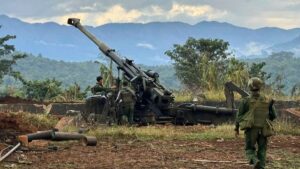On March 19, 2024, HRN delivered the oral statement at the 55th Regular Session of the United Nations Human Rights Council. About 35 states and 10 NGOs gave oral statements during the Interactive Dialogue with the Special Rapporteur [“SR”] Tom Andrews on the situation in Myanmar. This blog post will highlight the crucial aspects of the discussions and the key issues Myanmar faces today, including the remarks made and solutions proposed by the SR at the end of the meeting.
Situation in Myanmar and the interactions among the member states
Myanmar has been under a military coup for 3 years and is facing a grave human rights crisis. The SR in his opening remarks urged the international community including all member states and the HRC to pay attention and engage with this issue. By pointing out that the Human Rights Council and all the member states must act together, the SR highlighted the good and bad aspects of the situation. He stated that the time is turning as there is resistance amongst the opposition forces and the military junta is losing its capacity to unite the country, while the bad news is that the junta is extremely dangerous and is making use of sophisticated powerful weapons against civilians. He also raised concerns about the attacks on civilians from the air strikes and landmines and the displacement issues. There is a 5-fold increase in air strikes and 2.7 million Myanmar people are displaced and about 1 million are expected to be displaced this year. Moreover, 18.6 million people, including 6 million children, need humanitarian aid.
The SR in his opening remarks also briefly talked about 3 steps that could pave the way for the Myanmar people. First, a humanitarian aid strategy needs to be built that could lend aid to the affected community as efficiently as possible. Second, he urged member states to join hands together to open investigations in the ICC for war crimes and crimes against humanity, and third, to invest for reparations in Myanmar’s transition.
The majority of member states spoke about the universality of tackling the human rights issues by the international community as a whole and showed their solidarity and support to the people of Myanmar, raising the issues of forced conscription, gender and sexual-based violence and other systematic human rights violations against the people of Myanmar. especially the Rohingyas. On the other hand, some states were against the idea of putting pressure on the state of Myanmar by calling it their “internal matter” and believed in seeking solutions via political negotiations only.
Statements by NGOs
The Human Rights Institutions and the NGOs pointed out issues such as attacks on medical institutions in Myanmar, the decline in maternal health and access to education, increasing displacements, etc. HRN gave the oral statement highlighting the following:
- Plight of over 2.2 million people displaced since the Military’s illegal coup.
- Lack of access to essentials like shelter, food, electricity, and medical care, to the internally displaced people and constant fear of landmines and shootings among them.
- Situation of women who are often separated from their husbands and forced to care for their families without resources and the cases of sexual violence by the Myanmar military.
- Military’s plan of compulsory military service that could prolong the conflict in Myanmar.
HRN called upon the military to end its illegal rule and urged the international community to implement stronger sanctions and provide support to internally displaced people.
Concluding Remarks by the Special Rapporteur
SR Tom Andrews addressed all the issues and elaborated that this is not an internal matter of Myanmar and warrants world attention, urging the member states to invoke Article 14 of the Rome Statute and refer the matter to the Prosecutor of the International Criminal Court. Regarding the situation of Rohingya, the SR highlighted that it is an extraordinary situation for the Rohingyas as they are not even allowed to leave the villages that are under attack. They cannot move to safe places. Moreover, Rohingya children are suffering permanent damage due to malnutrition. He denounced the plan of forced conscription, calling it “outrageous” since such an expectation for Rohingyas to fight alongside the military responsible for genocide against their own community is utterly unacceptable. He called for action and humanitarian aid inside of the country which must be directed to the conflict areas where the junta is preventing the aid, thus, stressing that the focus must be on the areas under siege.
The impact on women cannot be overlooked since Myanmar’s economy has collapsed and half the population is below the poverty level, thereby impacting the families, especially the Myanmar women. The Myanmar women under detention are also experiencing sexual abuse and harassment.
SR called for immediate action and urged the member states and the Council to put forward a resolution and join hands together to help the Myanmar people by cutting access to money and weapons supply to the junta.




